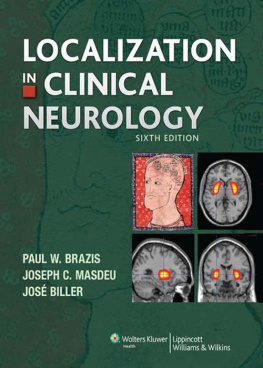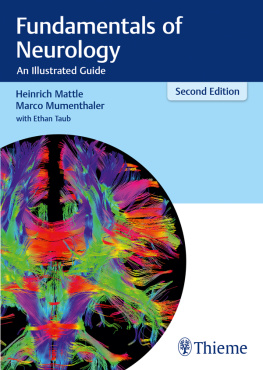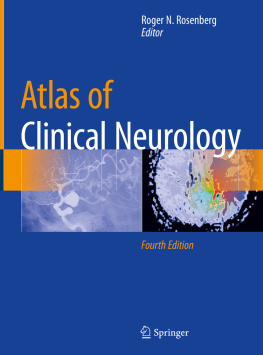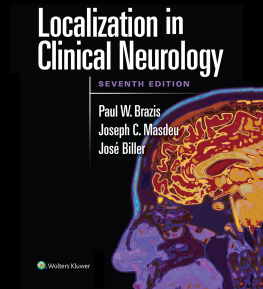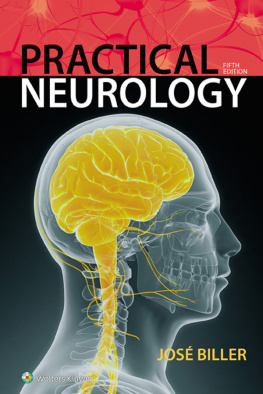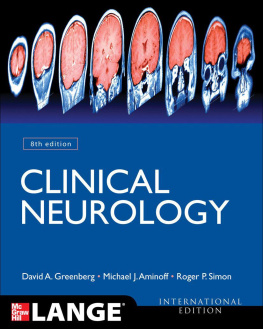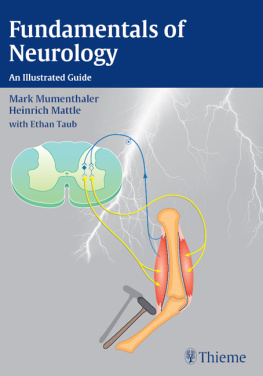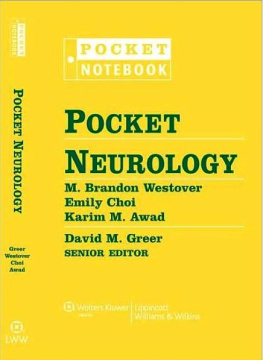LOCALIZATION IN
CLINICAL NEUROLOGY
SIXTH EDITION
Paul W. Brazis, MD
Professor of Neurology
Consultant in Neurology and Neuroophthalmology
Mayo ClinicJacksonville
Jacksonville, Florida
Joseph C. Masdeu, MD, PhD
Senior Staff Physician and Scientist
Section on Integrative Neuroimaging
National Institutes of Health
Bethesda, Maryland
Adjunct Professor of Neurology
New York Medical College
Valhalla, New York
Jos Biller, MD, FACP, FAAN, FAHA
Professor and Chairman
Department of Neurology
Loyola University Chicago
Stritch School of Medicine
Maywood, Illinois

Acquisitions Editor: Frances Destefano
Product Manager: Tom Gibbons
Vendor Manager: Alicia Jackson
Senior Manufacturing Manager: Benjamin Rivera
Marketing Manager: Brian Freiland
Creative Director: Doug Smock
Production Service: Aptara, Inc.
2011 by LIPPINCOTT WILLIAMS & WILKINS, a WOLTERS KLUWER business
Two Commerce Square
2001 Market Street
Philadelphia, PA 19103 USA
LWW.com
All rights reserved. This book is protected by copyright. No part of this book may be reproduced in any form by any means, including photocopying, or utilized by any information storage and retrieval system without written permission from the copyright owner, except for brief quotations embodied in critical articles and reviews. Materials appearing in this book prepared by individuals as part of their official duties as U.S. government employees are not covered by the above-mentioned copyright.
Sixth Edition
Printed in China
Library of Congress Cataloging-in-Publication Data
Brazis, Paul W.
Localization in clinical neurology / Paul W. Brazis, Joseph C. Masdeu, Jos Biller. 6th ed.
p. ; cm.
Includes bibliographical references and index.
ISBN-13: 978-1-60913-281-1 (alk. paper)
ISBN-10: 1-60913-281-5 (alk. paper)
1. Nervous system--Diseases--Diagnosis. 2. BrainLocalization of functions. I. Masdeu, Joseph C. II. Biller, Jos. III. Title.
[DNLM: 1. Nervous System Diseases--diagnosis. 2. Diagnostic Techniques, Neurological. WL 141]
RC348.B73 2011
616.80475dc22
2010050172
Care has been taken to confirm the accuracy of the information presented and to describe generally accepted practices. However, the authors, editors, and publisher are not responsible for errors or omissions or for any consequences from application of the information in this book and make no warranty, expressed or implied, with respect to the currency, completeness, or accuracy of the contents of the publication. Application of the information in a particular situation remains the professional responsibility of the practitioner.
The authors, editors, and publisher have exerted every effort to ensure that drug selection and dosage set forth in this text are in accordance with current recommendations and practice at the time of publication. However, in view of ongoing research, changes in government regulations, and the constant flow of information relating to drug therapy and drug reactions, the reader is urged to check the package insert for each drug for any change in indications and dosage and for added warnings and precautions. This is particularly important when the recommended agent is a new or infrequently employed drug.
Some drugs and medical devices presented in the publication have Food and Drug Administration (FDA) clearance for limited use in restricted research settings. It is the responsibility of the health care providers to ascertain the FDA status of each drug or device planned for use in their clinical practice.
To purchase additional copies of this book, call our customer service department at (800) 638-3030 or fax orders to (301) 223-2320. International customers should call (301) 223-2300.
Visit Lippincott Williams & Wilkins on the Internet: at LWW.com. Lippincott Williams & Wilkins customer service representatives are available from 8:30 am to 6 pm, EST.
10 9 8 7 6 5 4 3 2 1
This volume is dedicated to Drs. Frank Rubino and Sudhansu Chokroverty, who first taught us the skills and value of localization in clinical neurology.
Preface
This new edition of Localization in Clinical Neurology is again written for frontline clinicians who care for patients with neurologic disease processes and who are confronted with the Where is it? of neurologic disorders. This edition contains much updated information, some new charts on the differential diagnosis of clinical entities, and upgraded images to aid in neurologic localization, in addition to a new chapter on the localization of lesions of the autonomic nervous system. We hope that this volume may help in the clinicians quest to diagnose patients with neurologic problems with greater accuracy and the least cost.
Dr. Brazis especially expresses his appreciation to his colleagues at the Mayo Clinics in Jacksonville, Scottsdale, and Rochester and expresses his gratitude to his teachers and friends: Drs. Neil Miller, Andrew G. Lee, Frank A. Rubino, Jonathan D. Trobe, James J. Corbett, James Bolling, and Michael Stewart.
Dr. Masdeu acknowledges the help of many colleagues and friends, too many to be mentioned by name, particularly at the New York Medical College, the Medical School of the University of Navarra, and the Section on Integrative Neuroimaging at the National Institutes of Health.
Dr. Biller is indebted to his colleagues at Loyola University Chicago, and foremost to his wife, Rhonda, his children, stepchildren, and his grandson, Selim, for their constant encouragement and unfailing patience.
Paul W. Brazis
Joseph C. Masdeu
Jos Biller
1
General Principles of Neurologic Localization
Introduction
Fittingly, a book on localization in clinical neurology should begin with a chapter explaining what the term localization means. Localization derives from the Latin term locus or site. Localization is the diagnostic exercise of determining from the signs (most often) or symptoms of the patient what site of the nervous system has been affected by a disease process. Important injury to the nervous system results in abnormal function, be it behavioral, motor, or sensory. Characteristics of the dysfunction often pave the way for a topographic (from the Greek term topos or place) diagnosis. Localization and topographic diagnosis refer to the same thing: the determination of where in the nervous system the damage has occurred.
Even in the age of sophisticated neurophysiology, neuroimaging, and molecular biology, the clinical diagnosis should precede the use of these other techniques if their full diagnostic potential is to be realized. Clinical localization has particular relevance to the adequate use of ancillary procedures. For instance, false-positive findings from gunshot approach neuroimaging can only be avoided by careful localization. As an example, congenital brain cysts, strikingly visible on imaging procedures, are often wrongly blamed for a variety of neurologic disorders, while the actual disease remains overlooked and untreated. The thoughtful use of ancillary procedures in neurology, guided by clinical localization, minimizes discomfort for patients and the waste of resources.

